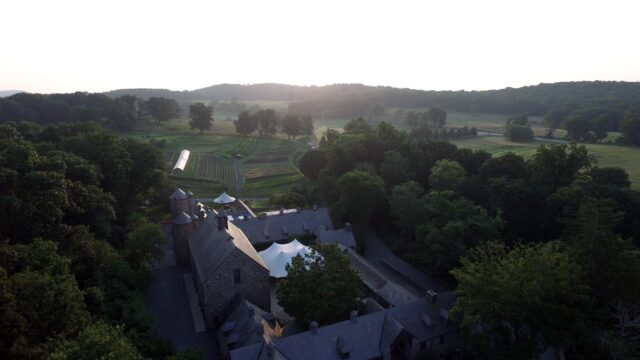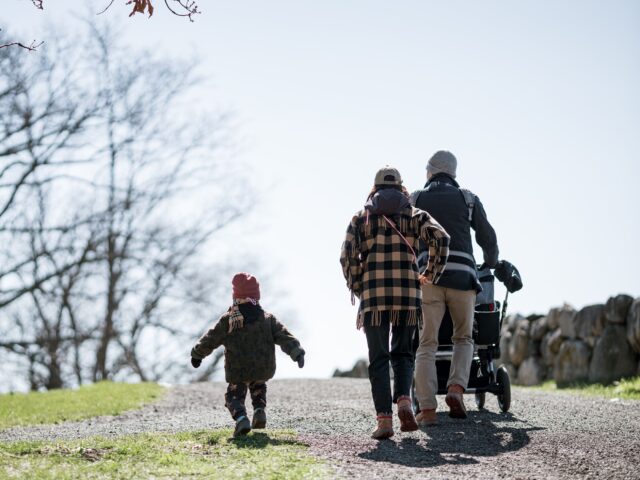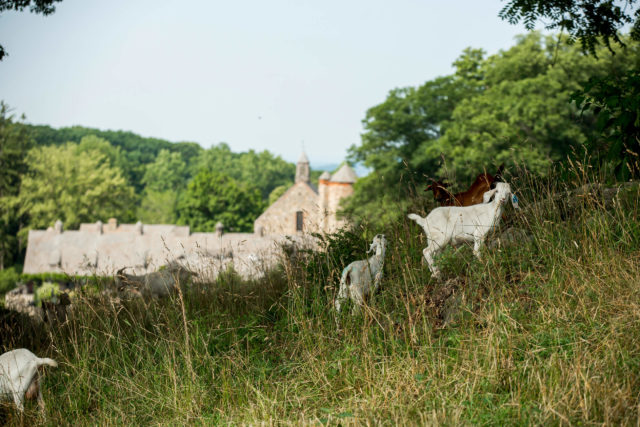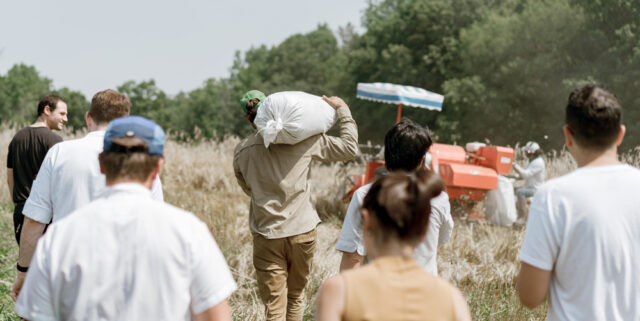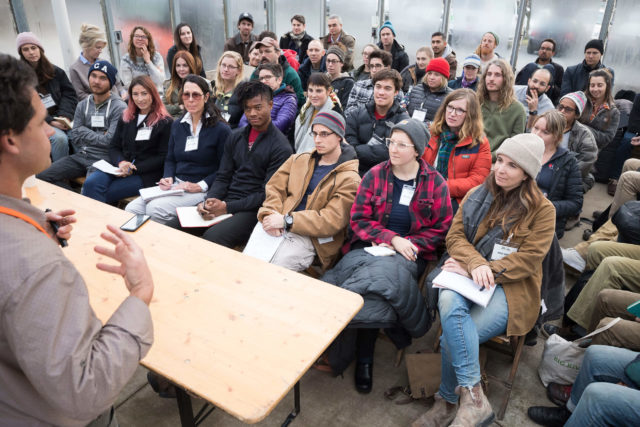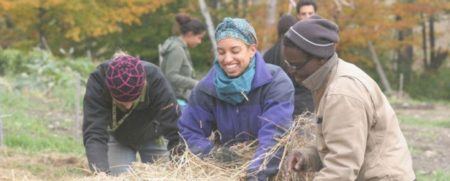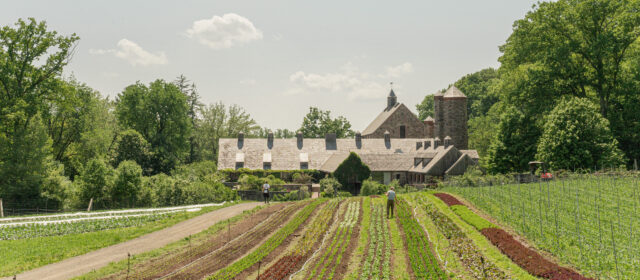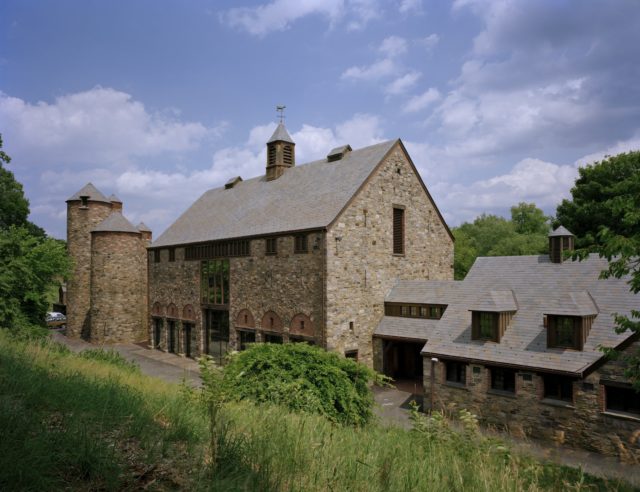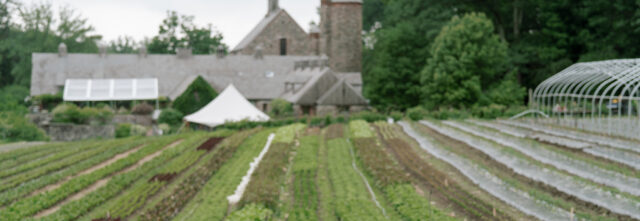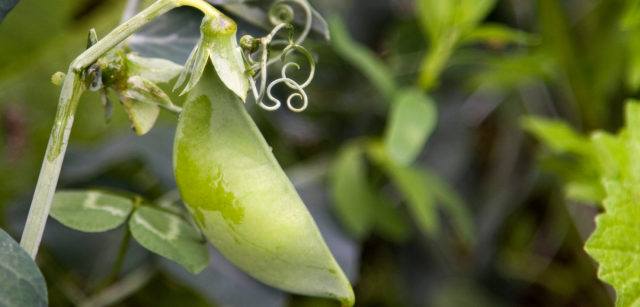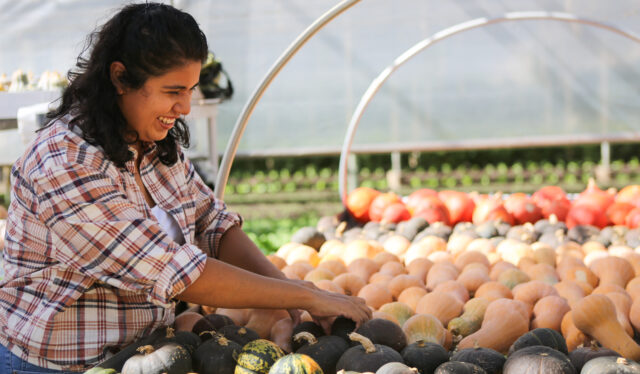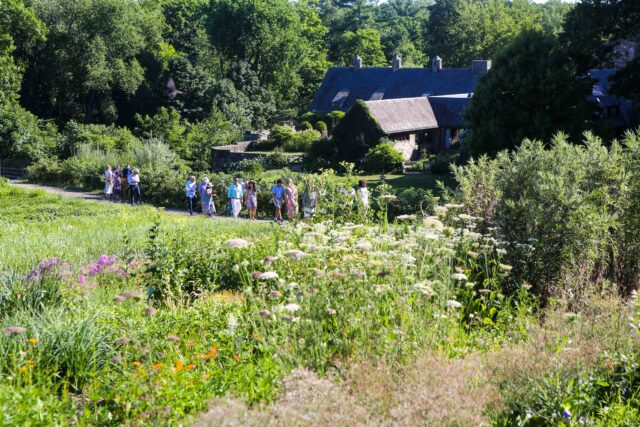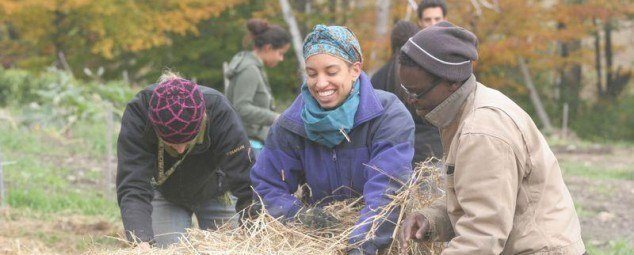From the 2015 Young Farmers Preconference — “This Is How We Do It: Learning From Successful Farm Models.
Soul Fire Farm
Jonah Vitale-Wolff and Leah Penniman
Grafton, NY
—
SNAPSHOT QUESTIONS
When did you start your farm?
We purchased our land in December of 2006, and started commercial farming operations in the 2011 season.
What do you produce?
Over 80 diversified vegetable crops, pasture raised chicken and eggs. Herbs, berries and orchard fruits for homestead consumption.
How big is your farm?
2 acres farmed, 65 acres mixed forest.
Where is it?
Grafton, NY (35 northeast of Albany, NY, 25 minutes east of Troy, NY, 20 minutes west of Williamstown, MA and Bennington, VT)
What is your soil type and topography?
Mountainous, heavy clay and originally highly degraded soils, with high water table. We started with about 6-8 inches of topsoil and have close to tripled that.
Do you lease, rent or own your land?
Own.
What are your markets?
Our food is distributed almost exclusively through farm share or CSA model which is on a sliding scale. 75% of our shareholders live in USDA determined food deserts. 50% of our shareholders identify as “low income” and 33% use EBT/SNAP to pay for their shares. We additionally do limited marketing through our community networks for specific products not regularly included in the CSA boxes such as our chicken, herbal salves, garlic seed and abundant produce.
IN-DEPTH QUESTIONS
What made you want to start your farm? What was your dream?
Both of us lived and worked on farms from very early. Leah at 16 with the Food Project, and Jonah started at Many Hands Organic Farm at 19. Farming was always one central component to living connected to land and as community. In our mid-twenties with two young children, we were living in the densely populated poor predominantly Black South End neighborhood of Albany. There were few options for fresh, nourishing food. We walked over 2 miles, children in tow to pickup a CSA share, the closest fresh produce available. We came into understanding how easy it was to get alcohol, drugs, and processed food — all on the street corners and all weapons of oppression — and so difficult to get nourishing food. We set out with a love of the land, and to create a resource to nourish our community with the food we grow and connection to earth. We always saw youth and adult programming, and a community of families, but never could have imagined the profound way it has manifested.
How were you involved in farming before you started your own farm?
Jonah traveled internationally extensively in his early 20s, moving from one farm or homestead project to another through the WWOOF program. He returned to the US, inspired to deepen his skills and knowledge of sustainable agriculture. He started as a biodynamic farming apprentice at Live Power Community Farm in Northern California, before returning to the east to work for many years and many capacities at Many Hands Organic Farm of Julie Rawson and Jack Kittredge in Barre, MA. Jonah also coordinated the city-wide community gardens program in Worcester, MA from 2001-2004, including starting an youth farming and empowerment program and urban farm, YouthGROW, that continues to grow food and work with young people.
Leah began farming with the Food Project in Boston, MA as a teen. Preparing and distributing food at homeless shelters in Boston, as well as selling Food Project produce at a farmers’ market, was an education and a source of inspiration that followed her down the years. She never stopped farming, going on to work at several farms around Massachusetts including the Farm School, and as comanager of Many Hands Organic Farm in Barre, MA. Leah also co-founded YouthGROW with Jonah, and continues to work with farmers in her ancestral homeland of Haiti and Ghana, West Africa.
How did you secure land and capital for your farm?
Initially, we saved, and have always lived frugally collectively which resulted in our job earnings being able to contribute towards a land purchase. We also had some modest savings from family. We have grown the farm slowly with off-farm income being our primary source of income in the beginning years. Leah is a full-time high school science teacher. Jonah owned and ran a natural building company before transitioning full time to the farm. Growing slowly has allowed us to stay true to our justice-based mission while investing in infrastructure development and community connection.
What problems did you run into in the planning stages?
Honestly, the most difficult things were deeply personal and connected to each of our most basic identities. Our drastic differences in class, racial, and ethnic backgrounds were magnified as we stepped into working together and making major life decisions on a whole new level. Possibly the most significant challenge was moving from a dense urban setting in a predominantly Black and Latino neighborhood to a rural setting with no visible neighbors and a nearly all-white town population. The identity and affirmation of our own family’s identity and emerging identity of our children was intimating intertwined with our urban community. Add this internal struggle to the challenges of building a house from the ground up, being parents of two young children, and working full time jobs to support the vision of our work. It is these very challenges that we have kept on the surface that have allowed us to be vulnerable with one another, learn and grow, constantly challenge each other, and lovingly welcome programs participants with accepting open hearts. It is not dreamy, nor easy, but a blessed life.
What did your farm look like in year one?
You have to understand that we had just moved from inner city Albany, were moving into a home we’d been building for 3 years with no kitchen or shower, and working full time jobs. So we cannot talk about the first years without the context of the entire project, which includes our house and lives.
That first year we said to ourselves: “We do not see it ethically responsible to grow food on this land for other people without knowing how it will produce.” Yet 20 families from our old neighborhood in Albany demanded we grow food for them. We agreed on the contingency that they give us fully honest feedback. Leading up this time of living on the land, we had experimented with scaling up sheet mulching, no-till, lasagna gardening – whatever you want to call it – to be semicommercially viable. So Leah produced 20 CSA shares for a short 16 week distribution season on her Sundays. Jonah was still running his natural building business full time so did little more than deliver food. It was in this first year that we truly came to understand how much of a need there is for food in communities affected by food apartheid, including the need to deliver directly to people’s homes due to the lack of means of transportation.
What were some challenges that you didn’t expect to have and how did you deal with them?
On the technical farming end: Learning about clay soils, which we have now grown to love due to their capacity to retain water in the driest of times as well as minimize leaching of nutrients and minerals. As we have mechanized more and more, we are still learning the fine line of using mechanized equipment and preserving soil structures.
Growing food on a slope, which we have been able to deal with by using semipermanent raised beds close to contour. Slope farming still poses issues for the tractor, but after working with farmers in the mountains of southern Mexico, I’m not complaining a bit.
Stuff breaking and how to fix it. I guess you just figure it out and find people who know. On the personal familial community end: Our rural school system is not acceptable to our family due to their complete lack of racial diversity and poor quality of education. So our children go to a private school on a hefty scholarship. It is a commute and also culturally limited.
Leah still commutes 60 minutes in one direction to work off the farm. For Jonah, running the farm can get lonely at times and overwhelming at others without logistical support from Leah.
Jonah: I loved being an apprentice in my 20s. I lived in 120-year-old barn lofts over milking stanchions, slept in tents for months at a time, worked 12 hour days 6 days a week for a meager stipend, and worked with exclusively white farmers with almost entirely white crews. When we put the call out for our intern program (now a full season apprenticeship program), our farm and mission attracted mostly people of color, many activists, and many women. What I had experienced as a white privileged male did not translate for our interns and later apprentices. The work dynamic of being a white male, managing women of color created a dynamic bigger than the sum of the individuals. We each brought all of our ancestry and histories of oppression to the table before even opening our mouths to talk. This dynamic extends to not just working together, but also living communally, compensation, work hours, and many other detail areas I was walking in privileged ignorance. This continues to be a major growth area as a project working towards liberation and racial justice based on land, while being a mixed race family and management team.
We have an advisory team that supports and advises Jonah, and also holds him accountable. We have also been very explicit about our ancestry and racial background, work expectations, and thought extensively about compensation and lodging. Jonah has also committed to dismantling his own racist patterns through trainings, peer counseling, and literature.
What were some indicators in the beginning stages that made you optimistic for your farm’s success?
We never saw otherwise. We have always been visionaries so the end goal is so huge, lifetimes even, that we recognize we can only contribute what we can. This farm is only partly about growing food, but even more so about creating the world we want to see and inhabiting it. Our space is a resource for our communities, and at the center of the struggles for racial justice and food sovereignty. We really see ourselves in the beginning stages.
Our work, from education to food distribution is about developing relationships and responding to the expressed needs. These relationships, locally, regionally, nationally, and now internationally are a huge affirmation of our work, and continue to give us cues as to the next steps of our work.
What have been some landmark events in your farm’s development? (equipment purchases, strategic decision, markets, etc.)
Our mission statement. Being clear about working with frontline communities and people of color. Restorative justice work with youth in collaboration with the Albany County District Attorney’s office. Liberatory and healing adult farm education, such as the Black and Latino Farmers Immersion. Starting our non-profit, Soul Fire Farm Institute. Leah’s multiple YES! Magazine articles. Building our passive solar house. Deciding to shift from all hand scale to some mechanization. Managing soil for micronutrients and soil life. Apprenticeship program. The current construction of the barn and loft apartment programming space.
Was there a point when you felt your farm became “established?”
Deciding to shelve my natural building business and transition to being on the farm full time. Established in our own hearts no matter what and our community was asking for more food and more programming.
How have your goals changed?
We have always been driven by the needs of our community. This started in our first year with growing food for those 20 families. As community organizers, we hold central the need to be effective listeners if we are to be the most effective agents of change in this movement towards a just food system and racial justice.
As we have grown our farm operations to meet the growing demand for food, we have also had a leap in the demand for our educational programming. The overwhelming demand for our educational programming has really made us focus on the educational component of our work, including recently starting a nonprofit arm to house all of our programming.
How have you been successful? (financial, production, quality of life, etc.)
The overwhelming national demand for our educational programming, local food distribution, and countless requests for speaking and writing, seem to be indication that the work we are doing is inspiring people and filling a much needed niche. For example, we have a waitlist of 150 people for our Black and Latino Farmer Immersion Program, dozens of youth groups waiting to attending our food justice day programs, and abundant speaking and writing requests we cannot fulfill. Leah is regularly writing for national publications about our work, including authoring for YES! Magazine. Her article on our restorative justice program for teens had a readership of close to 70k.
Our networks are expanding and constantly interweaving with others. As a movement, we are making concrete connections between ALL of the oppressive structures that hold up this system: racial justice, prison abolition, healing justice and more. Our new board of directors and advisory team reflects this interconnectedness of movements. Our solidarity work with Haitian and Mexican indigenous farmers is an international extension of this, in part supported by Leah’s Fulbright award last winter in Southern Mexico.
Graduates of our programs leave inspired, more whole, and many continue on to their own justice oriented work in the food system.
While we are flattered that participants in our adult programming are coming from all over the country, as far as California, Georgia, and Tennessee, the work is just beginning. If we are true to our vision of dismantling the oppressive structures that misguide our food system, then there will someday be culturally relevant farmer training programs for farmers of color all over the country, and a reversal of the trend of black and brown farmers shrinking in number.
We have paid very close attention to building biologically rich soil life resulting in higher quality, healthy and nutrient-rich food. The attention to building our soils is not just because we believe in sustainable agriculture. It is directly connected to the communities we feed who often lack high quality produce and nutrient-rich food. In addition to looking at quantity and quality of food per square foot, we think in terms of the nutrients we are growing per square foot. For our customers, good food is not a given, and for some, the box of food from Soul Fire is all they eat for a week. We strive to make every box of food we deliver nutritionally balanced with the optional protein share of eggs or sprouts.
Who or what can you credit for your successes?
First, our ancestors, who did everything they did so we could arrive at this time to do our hearts’ work. Our fierce collaborators, inspirations and dear friends who have been alongside us in growing this movement and challenging ourselves personally, Jalal Sabur, Natasha Bowens, Karen Washington, Malik Yakini, Ross Gay, lots more of course. Our community, who has held us and supported us, and allowed us to exercise our culture of gratitude and abundance. Our farm mentors, Julie Rawson and Jack Kittredge. Our dedicated volunteers and past apprentices.
What challenges does your farm face now and in the future?
Size and scope of project. We are being asked to speak at conferences, sit on panels, grow more food, host more programming. We need resources! Period. We have all the pieces in place to run robust and life changing programming not just for those attending, but to train future trainers and facilitators. We have the networks, waiting lists, skills, all of it. We just need money. We are striving to have Leah shift from being off-farm so much and begin to grow an organization that can respond to these needs, contribute in a meaningful way to such powerful work at a national and international level, AND create a sane and nourishing relationship with work.
Where do you see your farm in five years?
Our farm will be growing food for 120 families predominantly living within food apartheid communities who will be steering the contents and design of the farm share program, as well as have a relationship with the Soul Fire land. We will collaborate and network with black and brown owned and operated farms and other local sustainable farmers to continue to increase access for local families and contribute more food to Freedom Food Alliance Projects, such as the Prison Bus Project. There will be a comanagement team bottom-lining the farm operations, sales, and microenterprises. In addition to being part of the farm team, Leah and Jonah are predominantly coordinating and facilitating programming, writing articles, and speaking. We have regular exchanges with farmers from Haiti and Mexico. AND we as a family get a break every summer to be together, and travel internationally many winters to further our international work. Finally, we see additional families living on the land with us.
What advice would you give to beginning farmers?
Start small. You don’t have to do it all in the first, or second, or even third year. Design your life how you want it, and then fit the farm into it. Not the other way around. Most farmers in the US work off farm. You can still be a “farmer” and do other stuff.
That said: Stay connected with your heart and what nourishes you in addition to farming. Turning your love for land into your work means, well, it’s your work. If you play music, play music. If you dance, dance. Do art. Write. Whatever you do, make sure it is integral to your life.
Get experience. So many people approach us saying, “I want to start something like this. Where do I start?” My response is simple: Learn to farm. If you really want to talk about food as a tool for restorative and racial justice, you need the skills.
Radical honesty, while scary at times, ironically, has been very liberating. We have learned not to hide our major misgivings. Telling ourselves truths has made it easier to live with our major internal conflicts, such as living in a rural white town, and being separated from each other during the work and school day.
As a white farmer talking often to young aspiring white folks, I encourage people to school themselves on the overwhelming history of oppression-to-the-point-of-tears in this country. Then, go take a dismantling racism workshop, and assimilate the teachings into your life and work. Build relationships and listen. Don’t impose your ideas. I also advise any white person, farmer or not, to put themselves in uncomfortable situations. Push their comfort boundaries to step outside of unearned white privilege that is a backdrop and norm of US culture. Maybe this means sitting in a black baptist church service and staying for the meal afterwards. Maybe this means joining a cop-watch group. Maybe this means connecting with educational or healing work in prisons. Maybe this means going to volunteer at a shelter.
As this work for you evolves, there is societal level understanding and work and there is deeply personal work. It can be easy to feel bad about ourselves as white folks benefiting from racism. But that does not mean we are bad. It means we have healing to do. We have to love every bit of ourselves and histories, the beautiful and the ugly. It is only then that we can truly arrive at building a relationship with someone of a drastically different background and reality and fully see them. And maybe, just maybe, see through all the history and layers of oppression that affects us all, and the see the divinity within them. That is life work.
We are not waiting to see the world change. We are embodying the world we wish to live in, and inhabiting it.
—
More on Soul Fire Farm:
Originally published on March 15, 2016



